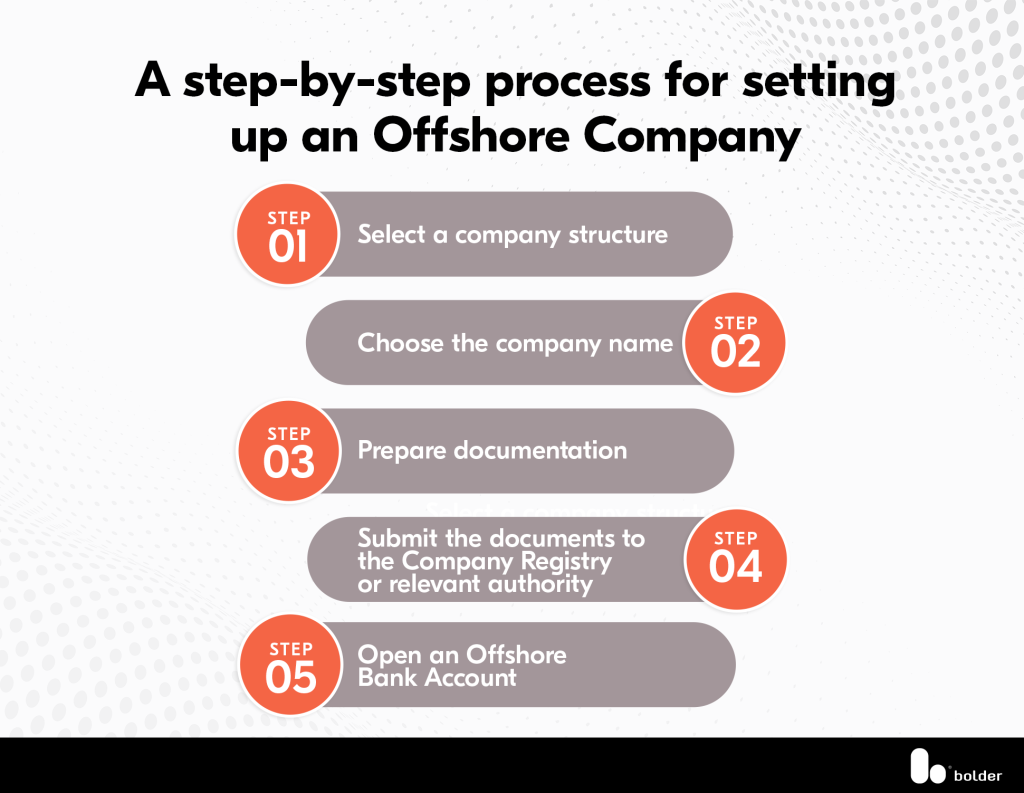Demystifying Offshore Business Formations: How They Operate and What to Expect
Offshore business formations can seem complicated and enigmatic. Offshore Company Formations. These entities, commonly established for tax obligation benefits and privacy, run under unique lawful structures. Entrepreneurs might find themselves steering via a labyrinth of policies and compliance requirements. Understanding the details is important for success. What are the genuine advantages? What are the prospective pitfalls? A closer exam reveals the nuances that can impact decision-making significantly
Understanding Offshore Business: Interpretations and Types
Offshore business are entities developed in a jurisdiction beyond an individual's or company's main country of home, usually for functions associated with tax obligation optimization, asset security, or governing benefits. These firms can take numerous kinds, consisting of restricted liability companies (LLCs), international service firms (IBCs), and offshore depends on. Each kind offers certain features and appeals to various demands.
Limited obligation business supply owners with protection from personal liability, while global business firms are prominent for their versatility and marginal coverage requirements. Offshore depends on, on the other hand, are utilized mostly for estate planning and possession defense.
The option of jurisdiction greatly influences the business's procedures, as some areas use more positive legal structures and privacy defenses. Offshore Company Formations. Comprehending the distinctions between these kinds is important for people and services considering offshore frameworks, as each option lugs various effects for administration and conformity
The Advantages of Developing an Offshore Business
Establishing an offshore company can provide numerous advantages, specifically for those looking for to boost their monetary strategies and shield their assets. One substantial benefit is tax obligation optimization; many territories offer beneficial tax obligation prices or exceptions, permitting organizations to preserve even more earnings. In addition, overseas business can offer a layer of personal privacy, protecting the identifications of proprietors and investors from public scrutiny.
An additional advantage is possession protection. By placing properties in an offshore entity, individuals can safeguard their wide range from possible legal cases or political instability in their home nations. This framework likewise helps with global organization procedures, allowing simpler accessibility to diverse clientele and worldwide markets.
In addition, the facility of an offshore business can improve trustworthiness and stature, appealing to clients who value international organization methods. Overall, these advantages make overseas firm formations an appealing alternative for companies and people going for financial development and security.
Key Factors To Consider Prior To Forming an Offshore Entity
Prior to developing an overseas entity, numerous important variables must be evaluated. Legal conformity needs, tax ramifications and benefits, as well as territory option, play a considerable duty in the decision-making procedure. Comprehending these considerations can aid organizations and individuals browse the complexities of offshore company formations successfully.

Lawful Conformity Requirements
When considering the development of an offshore entity, recognizing legal compliance demands is vital to ensure adherence to both neighborhood and global regulations. Potential company owners need to acquaint themselves with regulations governing firm registration, reporting responsibilities, and functional criteria in the picked jurisdiction. This consists of confirming the legal needs for directors and investors, in addition to ensuring conformity with anti-money laundering (AML) and know-your-customer (KYC) laws. Additionally, services must continue to be knowledgeable about any type of licensing requirements specific to their market. Involving neighborhood legal and economists can supply valuable insights, ensuring that all required documentation is prepared and submitted appropriately. Inevitably, extensive understanding of lawful compliance helps reduce risks and promotes a sustainable offshore procedure.
Tax Obligation Implications and Benefits
Numerous entrepreneur consider the tax obligation effects and benefits of creating an overseas entity as a critical consider their decision-making process. Offshore firms can provide considerable tax obligation benefits, such as lowered corporate tax prices, exception from certain regional taxes, and the capacity to delay taxes on international income. These benefits can bring about boosted productivity and capital, making offshore frameworks appealing for global service procedures. Furthermore, the capacity for tax obligation treaties may better decrease tax obligations. It is important for service proprietors to recognize the complexities included, consisting of compliance with both local and worldwide tax policies. Engaging with tax experts is recommended to browse these details properly and guarantee perfect tax planning methods.
Jurisdiction Selection Aspects
What aspects should one take into consideration when picking a jurisdiction for overseas firm development? Trick factors to consider include tax efficiency, regulatory atmosphere, and political security. Jurisdictions with desirable tax routines can greatly influence success. The regulative landscape needs to offer versatility and ease of conformity, enabling for effective service operations. Political stability is vital, as it guarantees the security of properties and connection of procedures. In addition, the reputation of the jurisdiction can impact customer depend on and organization connections. Availability to financial solutions and the availability of professional support solutions are additionally important. Understanding local regulations relating to reporting, ownership, and personal privacy demands is necessary to determine that the overseas entity aligns with the service proprietor's goals and lawful commitments.
The Process of Establishing an Offshore Business
Establishing an overseas firm involves a series of critical steps that require mindful planning and conformity with global regulations. At first, a specific should choose a suitable territory that lines up with their service purposes and provides beneficial tax obligation advantages. Complying with territory choice, the next action is to pick an unique company name and prepare the necessary paperwork, including short articles of unification and investor arrangements.
As soon as the paperwork prepares, it needs to be sent to the pertinent authorities in addition to the called for costs. After authorization, the business will receive a certification of unification, officially establishing its lawful presence. The individual must then open up a business savings account to help with financial purchases.
Ultimately, preserving an offshore firm entails sticking to continuous compliance demands, such as annual coverage and tax obligations, which differ by jurisdiction. As a result, understanding each action is necessary for an effective offshore firm formation.
Legal and Governing Framework for Offshore Business
While developing an overseas company can use significant advantages, it is vital to steer through the complicated navigate to these guys lawful and governing framework that governs such entities. Each jurisdiction has its very own set of regulations that dictate every little thing from business development to taxes and conformity requirements. These regulations are created to avoid illegal activities, such as money laundering and tax evasion, and usually require detailed documents and transparency.
Crucial element of this framework include the requirement of selecting neighborhood directors, preserving an authorized workplace, and sticking to yearly coverage commitments. In addition, several jurisdictions enforce details licensing needs for particular organization tasks. Recognizing these legal stipulations is vital for making sure compliance and mitigating risks related to fines or legal disputes. Engaging with lawful experts who specialize in overseas firms can assist in navigating via this complex landscape, ultimately promoting a effective and compliant overseas company procedure.
Typical Mistaken Beliefs Regarding Offshore Companies
Many individuals hold mistaken beliefs about offshore business, commonly relating them with tax evasion and illegal activities. Nonetheless, it is very important to acknowledge that these entities can operate lawfully within a structure developed for reputable business methods. Making clear the legal condition of overseas firms can help resolve these myths and advertise a more accurate understanding of their function.
Tax Obligation Evasion Misconceptions
Despite the growing appeal of overseas firms, mistaken beliefs concerning their use for tax obligation evasion linger. Many individuals wrongly think that developing an offshore entity is only a method to stay site clear of tax obligations. Overseas firms are often made use of for reputable objectives, such as property defense, global service growth, and investment diversification. The assumption that all overseas tasks correspond to illicit tax obligation evasion ignores the intricacies of worldwide tax regulations and conformity demands. Furthermore, the substantial bulk of offshore jurisdictions have actually carried out steps to combat tax obligation evasion, promoting transparency and info exchange. This mischaracterization can discourage genuine businesses and investors from discovering the prospective advantages of overseas company formations while bolstering a negative preconception surrounding these entities.
Lawful Condition Clarified
The lawful condition of overseas companies is often misconstrued, causing a variety of misunderstandings. Several believe these entities operate in a lawful gray location, presuming they are naturally illegal or unethical. Actually, offshore firms are legit companies created under the laws of certain territories, designed for various factors, consisting of asset security and market development. Another usual false impression is that offshore business escape tax obligations entirely; nevertheless, they go through the regulations and tax commitments of their home nations. In addition, some people think that overseas companies can be quickly check over here made use of for cash laundering or prohibited tasks. While misuse can take place, most jurisdictions impose stringent conformity and transparency legislations to mitigate such dangers, making sure that overseas firms run within lawful structures.

Handling and Operating Your Offshore Business Properly
Effectively managing and operating an overseas firm calls for a tactical strategy that balances compliance with neighborhood guidelines and the search of company goals. Successful offshore management involves understanding the jurisdiction's tax laws, reporting needs, and functional guidelines. Utilizing regional professionals, such as accountants and legal consultants, can supply invaluable understandings right into passing through these complexities.
Additionally, establishing clear interaction channels and operational protocols is vital for keeping effectiveness. Using technology for project monitoring and cooperation can boost efficiency, while regular efficiency examines warranty alignment with tactical purposes.
Furthermore, preserving robust financial documents is necessary, as transparency cultivates depend on with stakeholders and adhere to worldwide standards. Ultimately, being adaptable to adjustments in legislation or market problems enables offshore business to pivot effectively, ensuring lasting sustainability and growth. By sticking to these concepts, company proprietors can make best use of the benefits of their offshore endeavors while mitigating threats.
Regularly Asked Questions
Exactly how Much Does It Expense to Keep an Offshore Firm Yearly?
The expense to keep an offshore business every year differs substantially, generally ranging from $1,000 to $5,000, depending upon jurisdiction, services needed, and conformity commitments. It is vital to take into consideration additional fees for specific requirements.
Can I Open a Bank Account for My Offshore Company Remotely?
Opening a savings account for an overseas firm remotely is usually possible. Requirements might differ by jurisdiction, frequently necessitating paperwork and verification procedures, which can make complex the remote application experience for people.
Are There Certain Nations Recognized for Easier Offshore Company Formations?
Specific countries, such as Belize, Seychelles, and the British Virgin Islands, are renowned for their beneficial laws and structured procedures pertaining to offshore business formations, bring in entrepreneurs looking for effectiveness and confidentiality in service procedures.
What Kinds of Businesses Are Best Matched for Offshore Companies?
Particular services, such as financial investment, shopping, and consultancy firms, commonly benefit from offshore firms due to tax benefits, personal privacy, and regulatory versatility - Offshore Company Formations. These entities usually flourish in territories that advertise positive business settings
Exactly How Can I Make Certain Compliance With Neighborhood Laws When Running Offshore?
To assure compliance with local regulations when running offshore, it is necessary to involve lawful specialists, perform detailed research on territory guidelines, and maintain clear economic records, thereby minimizing threats associated with non-compliance.
